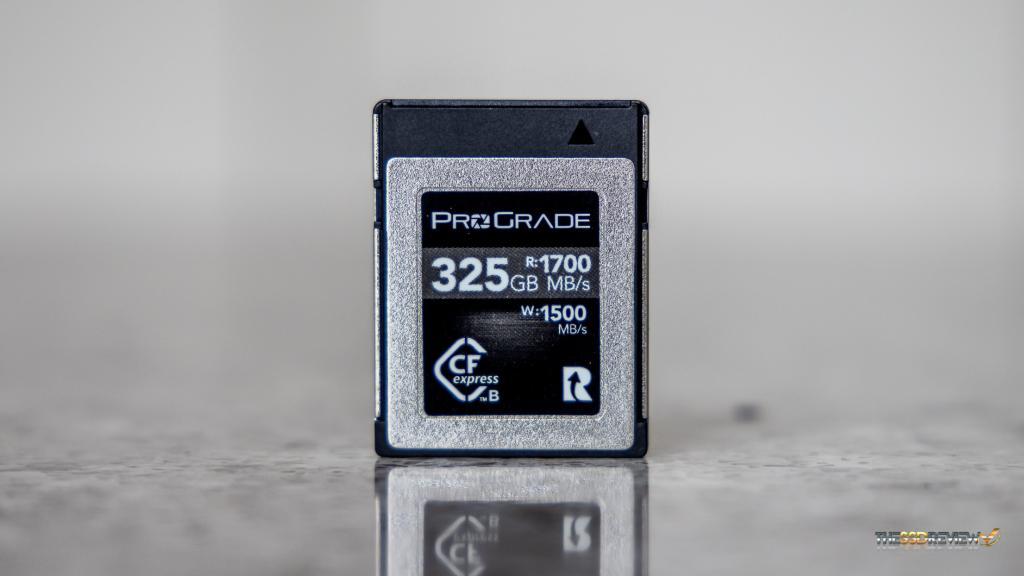PROGRADE DIGITAL 325GB 1700 COBALT CFEXPRESS B CARD
The ProGrade Digital CFexpress Type B card is available in 325GB and 650GB capacities and has listed specifications of 1700MB/s read a 1500MB/s write with an advertised sustained write speed of 1500MB/s. It has integrated thermal management and a laser etched serial number on the back of the card for increased security. Checking Amazon, we see the 325GB Cobalt listed at $429.99US with the 650GB capacity at $749.99.
We tested this card for sustained write performance and also monitored the temperature during this test. The highest temperature this card reached was 52°C and its sustained right performance was an incredible 1.33GB/s in moving 80GB of 8k video to the card.
Crystal Disk Info is a great tool for displaying the characteristics and health of storage devices. It displays everything from temperatures, the number of hours the device has been powered, and even to the extent of informing you of the firmware of the device.
This Crystal Disk Info score validates that we are running in PCIe 3.0 x2, and much more importantly, shows the typical temperature reached during write operations.
ATTO Disk Benchmark is perhaps one of the oldest benchmarks going and is definitely the main staple for manufacturer performance specifications. ATTO uses RAW or compressible data and, for our benchmarks, we use a set length of 256mb and test both the read and write performance of various transfer sizes ranging from 512b to 65mb. Manufacturers prefer this method of testing as it deals with raw (compressible) data rather than random (includes incompressible data) which, although more realistic, results in lower performance results.
It was very good to see a steady progression of performance with the increase of file size. High readings were just under 1.6GB/s read and 1.4GB/s write.
CRYSTAL DISK BENCHMARK VER. 7. 0.0 X64
Crystal Disk Benchmark is used to measure read and write performance through sampling of random data which is, for the most part, incompressible. Performance is virtually identical, regardless of data sample so we have included only that using random data samples.
THROUGHPUT
ANVIL STORAGE UTILITIES PROFESSIONAL
Anvil’s Storage Utilities (ASU) are the most complete test bed available for the solid state drive today. The benchmark displays test results for, not only throughput but also, IOPS and Disk Access Times. Not only does it have a preset SSD benchmark, but also, it has included such things as endurance testing and threaded I/O read, write and mixed tests, all of which are very simple to understand and use in our benchmark testing.
The AJA Video Systems Disk Test is relatively new to our testing and tests the transfer speed of video files with different resolutions and Codec.
TxBench is one of our newly discovered benchmarks that we works much the same as Crystal Diskmark, but with several other features. Advanced load bench-marking can be configured, as well as full drive information and data erasing via secure erase, enhanced secure erase, TRIM and overwriting. Simply click on the title for a free copy.
 The SSD Review The Worlds Dedicated SSD Education and Review Resource |
The SSD Review The Worlds Dedicated SSD Education and Review Resource | 


Overall a nice article. One thing to point out is there are big differences in card performance based on card size. Almost all 64GB CFExpressB cards have a low minimum sustained write speed. The ProGrade Gold card you tested is the fastest – the 1TB card – and smaller cards are much slower. The Canon R5 is a very good camera, but file size is what drives performance. The larger files of the Nikon Z7ii and Z9 are more demanding on card performance. Likewise smaller files but faster frame rates have a similar impact – more data to be written per second needs a faster card. The advice you gave is good – make sure you match what and how you use your camera to card choice.